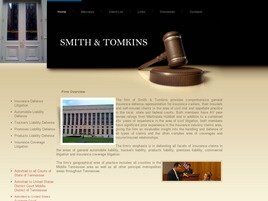lawyer in nashville tn Biogarphy
Source(google.com.pk)Since 1989, Mr. Harwell’s practice has focused on civil litigation in defense of employers and insurers. Over the past 23 years, he has taken hundreds of depositions and has tried over 100 cases. As reflected by his Representative Client Work, his practice is devoted to litigation and to counseling employers and businesses on the ways in which to successfully avoid litigation through proactive measures.
The successful results that he has achieved are primarily the result of diligent effort, attention to detail, experience and knowledge as a trial lawyer, a typically proactive/ aggressive attitude, and the resources of this firm. The best gauge of his success in serving the needs, demands, and expectations of a very discerning and sophisticated client base are through the clients, and references are available upon request.
As is reflected in his professional associations and in his community involvement, he is committed to assisting businesses with insight, perspective, and developments in the law. He is committed to giving of his time and energy for the betterment of his community and has worked in numerous leadership roles for various organizations in doing so. These leadership roles also illustrate his ability to work with people in an organized, cooperative, and successful manner to fulfill the goals of the organization.
Since approximately 2004, Mr. Harwell has served as Chairman of the Hiring Committee for Leitner, Williams, Dooley & Napolitan.
Bart Solomon has an extraordinary reputation for his dedication to representing the seriously injured in personal injury and workers' compensation litigation. Bart has built his legal career on the principle of aggressively pursuing full and complete compensation for his clients.
A 1988 graduate of the University of Cincinnati College of Law, Bart has over twenty years of trial experience. Bart is certified as a Civil Trial Specialist by the National Board of Trial Advocacy and the Tennessee Commission on Continuing Legal Education and Specialization.
Bart knows how to get justice for those who are seriously injured in a motor vehicle accident or an accident in the workplace. Bart is an experienced litigator, has successfully represented numerous plaintiffs before Tennessee and Georgia juries, and has a very high success rate.
D. Seth Holliday, Attorney
D. Seth Holliday is a 1996 graduate of Washington University School of Law and is licensed in both Tennessee and Illinois. As an attorney with McMahan Law Firm, LLC, Seth primarily litigates disability, health and life insurance claims on behalf of individuals who have been wrongfully denied their benefits.
With respect to private insurance benefits, Seth sues insurance companies like Unum, Hartford, Prudential, Standard, Guardian/Berkshire, CIGNA, MetLife, Aetna, Liberty Mutual, Mass Mutual, and others that have denied individuals their private disability insurance (called “Long-Term Disability” or “LTD”), life insurance or health insurance claims. His track record here is superb and he obtains excellent results for his clients. Seth is one of only a handful of attorneys across the U.S. that practices heavily in these areas. With respect to Social Security Disability or SSD cases, Seth has represented well over a thousand claimants at Social Security hearings, has a very high success rate, and is certified as Social Security Disability Specialist by the Tennessee Commission on Continuing Legal Education and Specialization.
Seth is a leader in prominent organizations such as the American Association for Justice (AAJ), Tennessee Association of Justice (TAJ) and the Tennessee Bar Association (TBA). Seth is a member of TAJ’s Board of Governors and past-Chair of AAJ’s Disability law Section, past-Chair of TBA’s Disability Law Section and past-President of the Chattanooga Trial Lawyers Association (CTLA). AAJ, TAJ, TBA and CTLA are all associations of lawyers who advocate on behalf of injured or impaired individuals. Seth has lectured regularly on disability issues to other attorneys and has also taught trial advocacy at DePaul University College of Law in Chicago, Illinois, and business law at Chattanooga State Technical Community College in Tennessee.
Seth also provides free legal services to a variety of charitable organizations in the Chattanooga area, including several hours on a weekly basis to the Chattanooga Community Kitchen and several hours approximately bi-monthly to Legal Aid of East Tennessee. Seth is a two-time past recipient of the Pro Bono Excellence Award. Seth is also a member of the Board of Directors for Hospice of Chattanooga (and serves as current Chairman of its Governance Committee, a member of its Executive Committee, and has served as a former member of its Finance Committee).
Deborah L. Gowen, Attorney
Attorney Deborah L. Gowen has a distinguished history of service fighting for the rights of individuals, particularly the disabled, to health care, benefits, and equal treatment under the law.
Gowen holds a Bachelor of Science degree in Public Health from the University of North Carolina at Chapel Hill School. She earned her Juris Doctor degree from the University of Georgia School of Law in 1996. Since that time, Gowen has been actively practicing law, litigating cases in both state and federal courts in Florida and Georgia, including Disability Discrimination cases. Gowen also taught UGA law students through civil and criminal clinical programs.
Since 2007, Gowen has limited her practice to disability cases. Gowen has won hundreds of Social Security Disability cases, at hearings and on appeal in the federal district courts. Gowen also works with a team of attorneys fighting insurance companies to secure Long Term Disability benefits for disabled workers.
Attorney Deborah L. Gowen is licensed to practice law in Florida and Georgia, and admitted to state and federal courts in both states, as well as the Eleventh Circuit Court of the United States. She is a member of the National Association of Social Security Claimants’ Representatives and Western Circuit Bar Association.
In 1909, the NAACP commenced what has become its legacy of fighting legal battles to win social justice for African-Americans and indeed, for all Americans. The most significant of these battles were fought and won under the leadership of Charles Hamilton Houston and his student and protégée, Thurgood Marshall.
After training the first generation of Civil Rights lawyers during his years as Dean of Howard University's Law School, Houston was appointed in 1935 o be the first Special Counsel of the NAACP. Often referred to as the "Moses of the civil rights movement," Houston was the architect and chief strategist of the NAACP's legal campaign to end segregation.
In 1896, the U.S. Supreme Court endorsed segregation in Plessy v. Ferguson, which established the "separate but equal" principle. In a study commissioned by the NAACP in the 1930s, Nathan Margold found that under segregation, the facilities provided for blacks were always separate, but never equal to those maintained for whites. This, Margold argued, violated the equality aspect of Plessy's "separate but equal" principle. Margold proposed a series of lawsuits that would challenge the system.
After joining the NAACP, Houston refined Margold's recommendations, developed a strategy, and implemented a battle plan. Under Houston's "equalization strategy," lawsuits were filed demanding that the facilities provided for black students be made equal to those available to white students, carefully stopping short of a direct challenge to Plessy. Houston predicted that the states that practiced segregation could not afford to maintain black schools that were actually equal to those reserved for whites. From 1935 to 1940, Houston successfully argued several cases using this strategy, including Murray v. Maryland, (1936) which resulted in the desegregation of the University of Maryland's Law School and State ex rel. Gaines v. Canada, in which the U.S. Supreme Court ordered the admission of a black student to the Law School at the University of Missouri (1938).
When Thurgood Marshall succeeded Houston as NAACP's Special Counsel, he continued the Association's legal campaign. During the mid-1940s, in Smith v. Allwright, Marshall successfully challenged "white primaries," which prevented African Americans from voting in several southern states. In Morgan v. Virginia (1946), Marshall won a case in which the Supreme Court struck down a state law that enforced segregation on buses and trains that were interstate carriers. In 1948, Marshall and other cooperating attorneys won an important victory in Shelley v Kraemer, which ended the enforcement of racially restrictive covenants, a practice that barred blacks from purchasing homes in white neighborhoods. In 1950, Marshall won cases that struck down Texas and Oklahoma laws requiring segregated graduate schools in Sweatt v. Painter and McLaurin v. Oklahoma. In those cases, a unanimous U.S. Supreme Court held that the Equal Protection Clause of the Fourteenth Amendment required those states to admit black students to their graduate and professional schools.
These decisions paved the way for one of the NAACP's greatest legal victories. In 1954, Thurgood Marshall and a team of NAACP attorneys won Brown v. Board of Education of Topeka, Kansas. In this landmark decision, the Supreme Court held that segregation in public education violated the Equal Protection Clause of the Fourteenth Amendment. Brown consisted of six separate cases in five jurisdictions; Kansas, South Carolina, Virginia, the District of Columbia and Delaware. These cases are remembered as "Brown" because Oliver Brown was one of several plaintiffs in the Kansas case whose name appeared first in the court filings. He was represented at the trial and in the Supreme Court by NAACP attorney Robert Carter, who developed the innovative strategy of using the testimony of social scientists and other experts to demonstrate the psychological injuries that segregation inflicted on African American school children.
The Brown decision inspired the marches and demonstrations of the civil rights movement of the 1950s and '60s. These wide-spread protests ultimately led to the enactment of the Civil Rights Act of 1964, the Voting rights Act of 1965 and the Fair Housing Act of 1968. During this period, the Association represented civil rights workers and fought to implement Brown in numerous desegregation cases across the nation. Cases were filed that successfully challenged discrimination in public accommodations, housing, employment, voting.
Today, NAACP attorneys are still challenging racial discrimination whether it appears in the guise of corporate hotel policies that discriminate against African-American college students, voting disenfranchisement during national presidential elections or state sponsored symbols of white supremacy, such as the confederate battle flag. The NAACP's Legal Department focuses on class actions and other cases of broad significance in areas including employment, education, housing, environmental justice, criminal law and voting, striving always, to advance the Association's goals while remembering Charles Hamilton Houston's admonition that "[A] lawyer is either a social engineer or a parasite on society."
Lawyer in nashville tn Wallpaper Photos Pictures Pics Images 2013

Lawyer in nashville tn Wallpaper Photos Pictures Pics Images 2013

Lawyer in nashville tn Wallpaper Photos Pictures Pics Images 2013

Lawyer in nashville tn Wallpaper Photos Pictures Pics Images 2013

Lawyer in nashville tn Wallpaper Photos Pictures Pics Images 2013

Lawyer in nashville tn Wallpaper Photos Pictures Pics Images 2013

Lawyer in nashville tn Wallpaper Photos Pictures Pics Images 2013

Lawyer in nashville tn Wallpaper Photos Pictures Pics Images 2013

Lawyer in nashville tn Wallpaper Photos Pictures Pics Images 2013

Lawyer in nashville tn Wallpaper Photos Pictures Pics Images 2013

Lawyer in nashville tn Wallpaper Photos Pictures Pics Images 2013
No comments:
Post a Comment